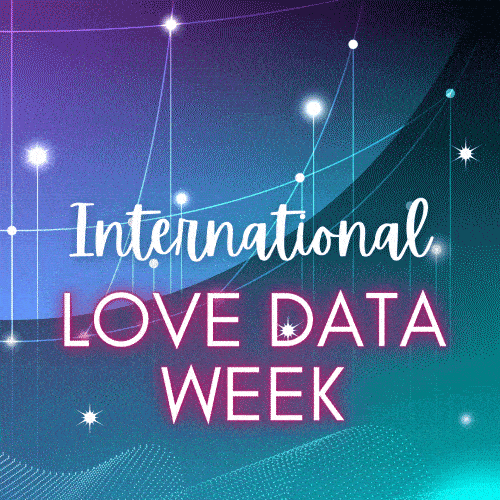Don’t we all love data? Love Data Week (Feb. 14-18) is an international celebration of data hosted by the Inter-university Consortium for Political and Social Research (ICPSR). Love Data Week is a project to raise awareness of the importance of data in our daily lives. This is an opportunity to engage the larger community through such topics as data analysis, preservation, curation,  dissemination, sharing, and reuse. This year’s theme is “Data is for Everyone.” You can follow LDW on social media with the hashtag #LoveData22. Check out the events happening internationally. There are some useful website links on working with data at the end of this blog.
dissemination, sharing, and reuse. This year’s theme is “Data is for Everyone.” You can follow LDW on social media with the hashtag #LoveData22. Check out the events happening internationally. There are some useful website links on working with data at the end of this blog.
About the Inter-university Consortium for Political and Social Research
This is the second year that ICPSR is sponsoring Love Data Week. The ICPSR is an international consortium of more than 750  academic institutions and research organizations that provides “leadership and training in data access, curation, and methods of analysis for the social science research community.” You can find data, share your data (for free!), use their resources to teach about data, and take courses in their summer program (Summer Program in Quantitative Methods of Social Research).
academic institutions and research organizations that provides “leadership and training in data access, curation, and methods of analysis for the social science research community.” You can find data, share your data (for free!), use their resources to teach about data, and take courses in their summer program (Summer Program in Quantitative Methods of Social Research).
Adopt a Dataset
Part of the Love Data Week festivities is for participants to get involved in adopting a dataset. You can choose from a list of datasets curated by ICPSR. Some of the datasets include: Census of Governments, 1962 and 1967; Slave Sales and Appraisals, 1775-1865; Charleston Heart Study, Charleston, South Carolina, 1960-2000; Transgender Discrimination Survey (NTDS); COVID-19 Disruptions Disproportionately Affect Female Academics, Global, 2020; TransPop, United States, 2016-2018; Collaborative Multi-racial Post-election Survey (CMPS), United States, 2016; National Longitudinal Survey of Public Health Systems (NALSYS), [United States], 1998-2018; Latino National Surveys 2006; Dunham’s Data: Katherine Dunham and Digital Methods for Dance Historical Inquiry, Everyday Itinerary, 1950-1953; Comprehensive Post-Acute Stroke Services (COMPASS), North Carolina  2016-2018; and The Gender and Multicultural Leadership Project: The Future of Governance.
2016-2018; and The Gender and Multicultural Leadership Project: The Future of Governance.
Once you have found a dataset that interest you, fill out the Dataset Adoption Form. You can choose to download the dataset, analyze it online, or review the the summary information for it. Your task is to learn about the dataset and share your findings through email or social media. Participants will receive a certificate of completion.
For more information on managing data, take a look at Catholic University Libraries’ Digital Scholarship services.
Useful Links
Love Data Week – Brown University Library
